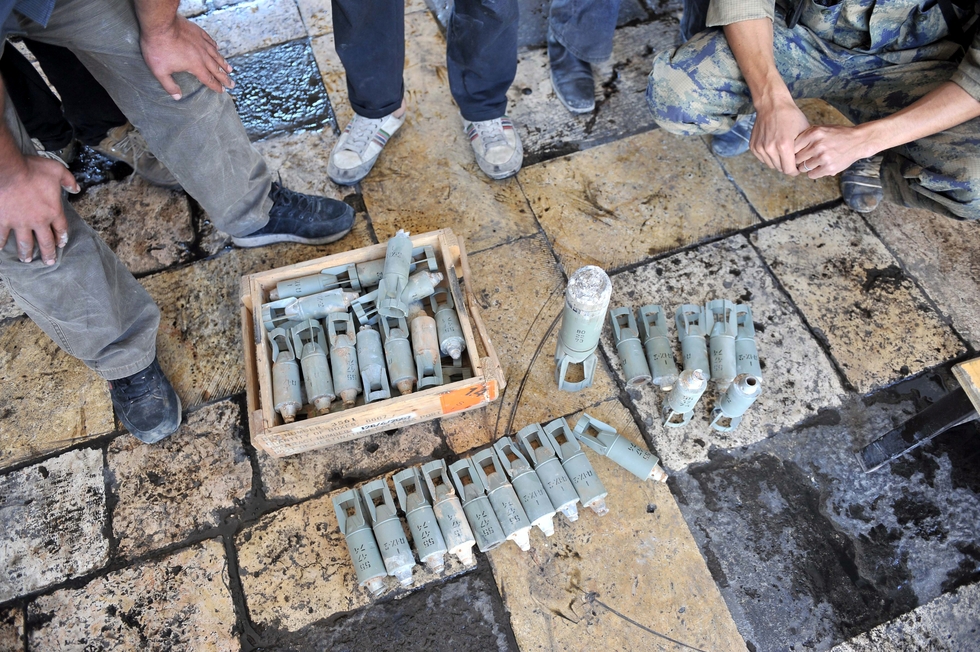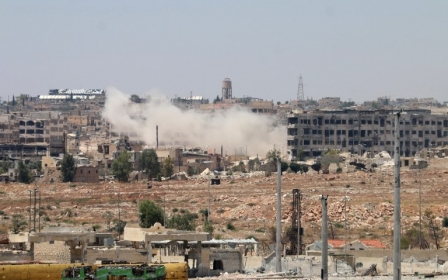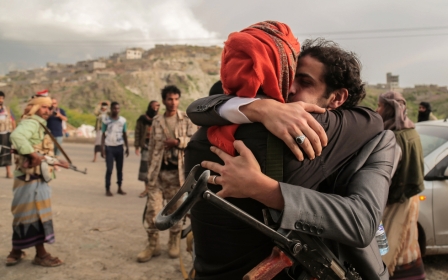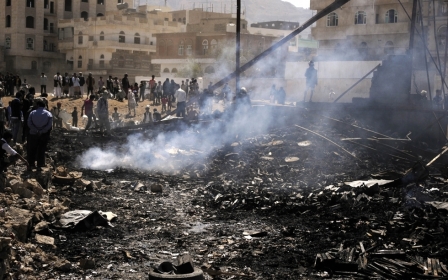Cluster bombs killing hundreds in Syria and Yemen wars

More than 400 people were killed by cluster bombs in 2015, most of them in Syria, Yemen and the Ukraine, which have not signed a treaty banning the weapon, an international anti-cluster bomb coalition said on Thursday.
Cluster bombs, dropped by air or fired by artillery, scatter hundreds of bomblets across a wide area that sometimes fail to explode and are difficult to locate and remove, killing and maiming civilians long after conflicts end.
They pose a particular risk to children, who can be attracted by their toy-like appearance and bright colours, a fact highlighted by Middle East Eye correspondent Peter Oborne in his report from Yemen.
In 2015, cluster bombs killed 417 people, more than a third of them children, the Cluster Munition Coalition said, adding that the actual number of casualties was probably much higher.
"The suffering is still continuing and civilians continue to be the predominant victims of cluster bombs," said Jeff Abramson, programme manager at Landmine and Cluster Munition Monitor, which is part of the coalition.
"Unfortunately now we're seeing a new spate of people being injured at the time of attack, which is something that needs to be condemned very strongly," he told Thomson Reuters Foundation by telephone from Geneva.
Abramson did not give figures for 2014, saying data was constantly being revised due to difficulties in gathering it, especially in conflict zones like Syria.
The majority of cluster bomb casualties in 2015 were in Syria (248), followed by Yemen (104) and Ukraine (19), the coalition said in a report.
Handicap International, which helped compiled the study, said there was "compelling evidence" that Russian forces were using cluster munitions in Syria, a claim denied by Moscow.
"There is compelling evidence that Russia is using cluster munitions in Syria and/or directly participating with Syrian government forces in attacks using cluster munitions on opposition-held areas of governorates such as Aleppo, Homs and Idlib, and on armed opposition groups," the report said.
Handicap International urged signatories to the 2008 Oslo Convention on Cluster Munitions to demand that the warring sides stop using them.
The convention, which came into force in 2010, also requires the destruction of stockpiles of cluster bombs and clearance of contaminated areas.
Since August 2015, five more countries - Colombia, Iceland, Palau, Rwanda and Somalia - have ratified the convention, and Cuba and Mauritius acceded, bringing the total number of states that have signed or accepted the treaty to 119, the coalition said.
Casualties were also recorded in Laos, Lebanon, Afghanistan, Western Sahara, Chad, Cambodia and Nagorno-Karabakh.
Convention signatories are to meet in Geneva next week.
Also on Thursday, the last US maker of cluster bombs will cease producing the controversial weapons, which are banned by most governments because of their capacity to kill or maim civilians.
In a little-noticed announcement on Tuesday, the Rhode Island-based aerospace company Textron said it would no longer be making its "Sensor Fuzed Weapon" - the trade name for its cluster bomb - because of falling sales.
"In light of reduced product orders, we have decided to refocus our business to meet the future needs of our customer," Textron spokesman David Sylvestre said in a statement to AFP on Thursday.
New MEE newsletter: Jerusalem Dispatch
Sign up to get the latest insights and analysis on Israel-Palestine, alongside Turkey Unpacked and other MEE newsletters
Middle East Eye delivers independent and unrivalled coverage and analysis of the Middle East, North Africa and beyond. To learn more about republishing this content and the associated fees, please fill out this form. More about MEE can be found here.




